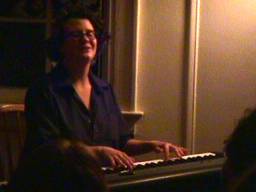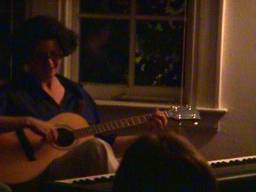the pathetic caverns - music by artist - Veda Hille
eclectic reviews and opinions
Veda Hille
You do not live in this world alone
(Veda Hille, 1999)
You do not live in this world alone opens with a half-minute instrumental, a collage of percussive sounds simultaneously reminiscent of a heartbeat, a skipping phonograph needle, and tapping the side of the microphone. In a way, it's a manifesto for one aspect of the record, which uses tape loops and electronics in a very unusual way.
Synthesizers are often used to "fake" real instruments. Tape loops are used to make a point of their own artificiality (as with Art of Noise). And electronics are often used to emphasize the dehumanization and depersonalization of harsh industrial music. This is something quite different: Hille (and "electro-acoustic artist" Christof Migone, who worked extensively with Hille to sculpt the record) use the sounds are in support of music that is very personal and human (it has what may be two of the best songs about good sex you will ever hear). It's almost an exploration of what emotional and musical value these sounds can have when separated from the notion that they're inherently gimmicky. What does the synthesizer play to itself, when there's no-one around to listen it?
If that were all this album had going for it, it might be worth a curious listen or two, but this is a dense, challenging, compelling set of songs. Hille is interested in ambiguity and multiple interpretations -- the record's title, for example, carries a message of responsibility -- don't screw the world up for everyone else -- as well as the suggestion that we live in many worlds, not all of them easy to perceive. "The Williamsburg Bridge," like "Ode to Billie Joe," to which it may allude, asks more questions than it answers: "Just when you think you got the map straight," Veda says with characteristic wry humour, "they go and change the route. Last night there was an accident, on the Williamsburg bridge." Like most of the album, the song is arranged with fine attention to detail: underpinned by Hille's insistent, idiosyncratic tenor guitar; driven by fierce, martial drums; colored by snarling slide guitar and unexpected trumpet flourishes.
Some of the songs are more easy to interpret. The spare, moody "Clumbsy" -- an intentional misspelling, suggesting "dumb" and maybe "numb" as well as "clumsy," warns that "love is not strong enough, we must be stronger than love," one of several lyrics that seem to speak of betrayal and the difficulties of reconciliation. "Ponybride" exults, "there's nothing wrong with feeling good," and then immediately chastises itself for being, "inane, inane."
One of the most striking things about this album is how hard it is to categorize. Spine, Hille's last release to receive US distribution, was easier: what if Tori Amos grew up listening to a lot of Thelonious Monk and wrote words that made more sense? A little hard to picture, maybe, but it gets you in the ballpark. "You do not live..." isn't so easy: the electronics wander in and out of songs, "All Fur" is arranged for string quartet, and "Killzone!" is full of hornet-like guitar buzz. It's not an easy listen, it's not radio-friendly, it'll never tear up the dance floor, but you could look long and hard and not find something more original, intelligent, and rewarding.
This review originally appeared in Snap Pop! magazine.
Veda Hille
20 November, 1998
Meth and Woj's House of Music (New Haven, CT)

Twenty people or so were crammed into the living room, spilling into the dining area, sitting on folding chairs, curled on two couches, standing quietly at the back of the room.
Outside, cars hissed by on wet pavement.
In front of the window were a Roland keyboard, a four-stringed tenor guitar, and Veda Hille.
Everyone was quiet, paying rapt attention.
Veda is one of the best pianists I've ever heard in a rock context. She's also one of the finest songwriters I've heard in years. When I first heard her, I was reminded immediately of Thelonious Monk -- Hille shares with him the use of odd intervals, a slightly idiosyncratic, but compelling, sense of timing, and melodies that take unexpected and beautiful twists.
It turns out Monk is someone Hille heard after forming her style, not before, but I still think it's a useful comparision.
What really arrested me, though, were Hille's lyrics. Not just the lyrics, but the synthesis between the words, their musical setting, and their delivery -- it's definitely a whole package sort of thing. But some of the individual lines and couplets, as in "Strange, Sad:"
behind her they are kissing loud and young
she struggles not to turn to look
to increase herself from only one
one standing at one bus stop
have a punch-in-the-gut impact for me, even without, or with only the memory of, the music that really makes them work. And Hille doesn't limit herself to one-dimensional songs of loss and love, joy, and anger, but also tackles more complex and less easily definable subjects.
Hille is also a very personable performer. There's a weird contrast between the emotional intensity of much of the material and her wry between-song commentary (on this night she shared anecdotes of touring in Europe -- toilets that turn into carwashes and such). But it's a pleasantly weird contrast.
I don't like relying on facile comparisons, but I haven't evolved a vocabulary to talk about vocalists without them. So: Hille's voice reminds me (by turns and in bits and pieces) of ani difranco, Jane Siberry, and just a tiny bit of Tori Amos (without any of the breathy affect, though).
Hille's records (you should be able to find three: Path of a Body, Spine and Here is a picture) are terrific in a different way: nosier, more "rock," but well arranged, not overdone, played with both chops and heart.

Here is a picture, subtitled "(Songs for E Carr)" is especially interesting: it's a song cycle about the life of painter Emily Carr, written in words spliced together from her journals. When I first heard about it seemed the sort of thing which might succumb to pretentiousness or preciousness, and I didn't listen to the record properly until after I'd been won over by live performances of the material. My loss; this is one of the comparitively small pile of really good "concept albums."
The songs on it, despite the cut & paste construction process, sound very much like Hille's own material (I'm left with the impression that on some level Carr and Hille must be more than a little sympatico), and instead of being a distraction (as it often is), the fact that songs fit into a larger context adds depth and richness.
It may seem like I'm going a bit overboard with the praise here. I'm not. Trust me on this one.
unauthorized reproduction prohibited.
all contents © 1995-2026 d. mayo-wells except where otherwise noted.



